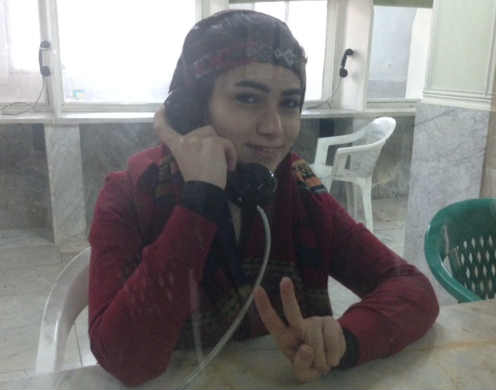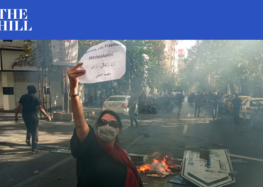Maryam Shafipour Sentenced to Seven Years for Strange Charges

A source close to the family of imprisoned student Maryam Shafipour, who was just sentenced to seven years in prison, told the International Campaign for Human Rights in Iran that Shafipour received the heavy sentence on strange and irrational charges such as “membership in Facebook,” “applying for a student visa,” “existence of a satellite TV receiver at her father’s house,” and “contact with the Heads of Sedition [Mousavi and Karroubi] during their house arrest.”
“Unfortunately, Maryam’s interrogator’s wish was implemented in her sentence. During those first few days of her detention, her interrogator told Maryam that if she doesn’t confess to her charges, she will get more than five years in prison,” said the source.
The source told the Campaign that the family intends to object to this sentence within the stipulated time. “Maryam’s family hopes that in the Rouhani administration, whose slogan is ‘moderation,’ a fair judge reviews their daughter’s case and dismisses this ruling, which is based on unrelated and unreal crimes, and releases Maryam,” the source told the Campaign.
A student activist and member of Mehdi Karroubi’s 2009 election campaign, Maryam Shafipour was arrested on July 27, 2013, when she appeared at Evin Prison Court after being summoned. She was transferred to Evin Prison, where she spent 67 days in solitary confinement and nearly eight months in “temporary detention,” while her case judge refused to release her on bail.
Shafipour’s lawyer was informed of her conviction by Branch 28 of Tehran Revolutionary Court under Judge Salavati on March 1, on charges of “propaganda against the regime” and “assembly and collusion against national security,” and sentenced to seven years in prison and two years’ ban on “cyberspace, media, and press activities.”
The source told the Campaign that Shafipour’s ruling is strange and unfair. “What does two years’ ban on ‘activities in cyberspace’ mean? Does it mean that after her release she is supposed to ask for permission to connect to the Internet in order to use it?”
“Maryam has two charges, ‘propaganda against the regime,’ and ‘assembly and collusion against national security.’ Examples of ‘propaganda against the regime’ have been provided as her publishing content in cyberspace through Facebook and ‘portrayal of a dark image’ of the Islamic Republic. What this means is that whoever writes any critical messages on Facebook can be accused of this ‘crime.’ Other examples of her crimes is that they found an application form for a student visa on her laptop computer. Under what law is applying for a student visa a crime?” the source told the Campaign.
“How has the charge of ‘assembly and collusion against national security’ been defined for her? With whom did she assemble? Why isn’t the name of that individual mentioned in the case? She had an assembly between herself and her laptop computer? Another one of the examples of her crimes is contacting the ‘Heads of Sedition’ [referring to opposition leaders Mir Hossein Mousavi and Mehdi Karroubi]. The ‘Heads of Sedition’ have been under house arrest for the past three years; how could Maryam have been in contact with them?” added the source.
“Another example of Maryam Shafipour’s ‘crimes’ upon which the court placed a lot of emphasis was her contact with the families of political prisoners and pursuit of their conditions and problems. Examples of her other crimes were ‘membership in the student organization to combat educational discrimination,’ and ‘contact with foreign media,” said the source. The source told the Campaign that Maryam Shafipour did not accept any of her charges in court. “The interrogator told Maryam that if she doesn’t accept her charges, she will receive a sentence of more than five years in prison. Apparently the Judiciary had no independence in issuing this verdict and whatever Maryam’s interrogator wished was granted,” the source said.
“Maryam thinks she should be released because she hasn’t done anything. In her visits she was very hopeful and kept telling her family that she would be released soon. She doesn’t know her ruling yet,” added the source.
Maryam Shafipour is a former student of Agricultural Engineering at Qazvin International University. She was first suspended from education for two terms and later dismissed from the university due to her student activities. In 2010, a Qazvin Revolutionary Court had sentenced her to one year in prison for her student activities, which had been suspended.






